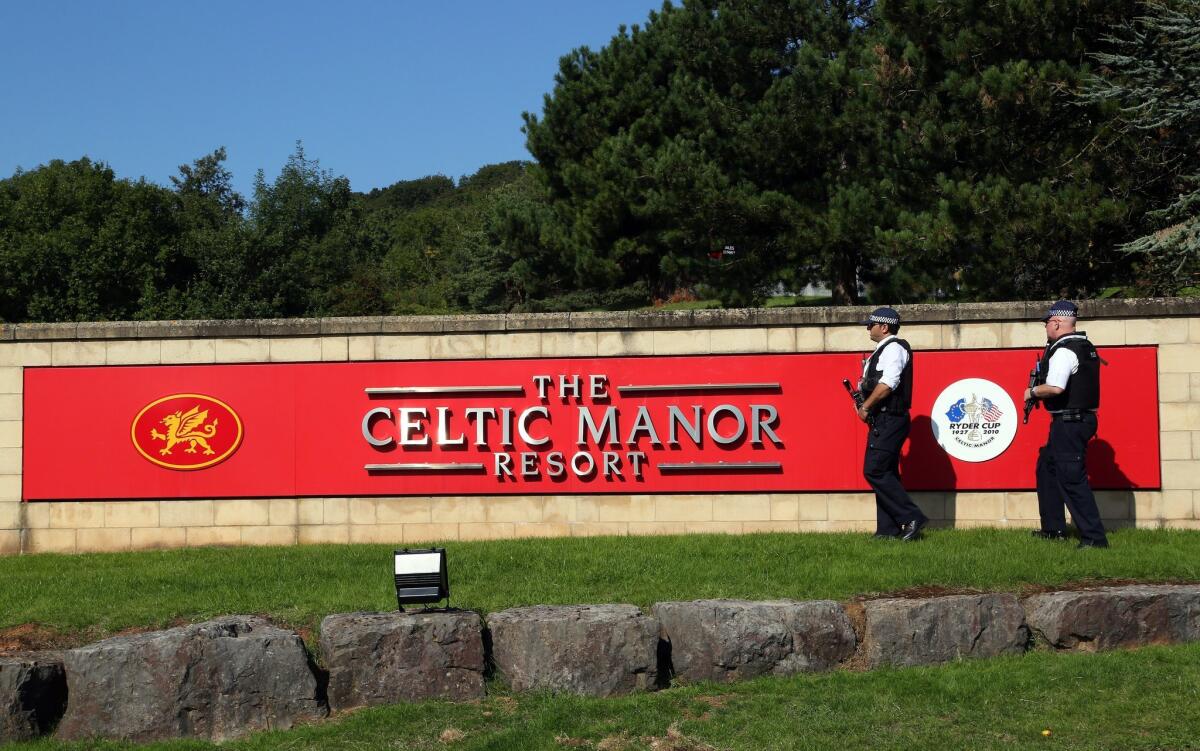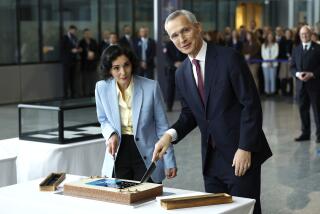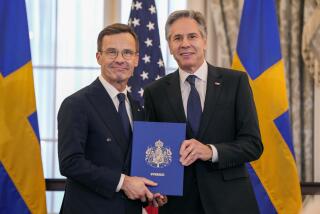Op-Ed: NATO’s newest mission: Conquering its generation gap

Armed London Metropolitan police officers on duty outside the Celtic Manor resort ahead of the upcoming NATO Summit in Cardiff, Wales.
As the leaders of NATO’s 28 countries gather this week for their annual summit, they will intone, as usual, their catechism of alliance solidarity. As at previous meetings, they will commit to policy initiatives aimed at better coordinating their collective defense. They may even condemn Russia’s invasion of Ukraine.
But none of this is likely to make much of an impression on those who most need to be convinced of the importance of the NATO alliance: the young people in NATO’s member countries.
On average, between a quarter and a third of the populations of NATO member countries is under 25 years of age (in Turkey, the figure is an astounding 42%.) This means that a sizable portion of those whom NATO protects have little or no actual memory of the Berlin Wall coming down, or the end of the Soviet Union or the Balkans coming apart. They were spared the ideological clash of the Cold War, with its ever-present threat of nuclear war, and know little of the repression experienced by the Soviet satellite states. To many young people, NATO appears anachronistic, which undercuts domestic political support for NATO today and could spell disaster for the alliance in the future. This is something NATO’s leaders should address at the upcoming summit in Wales.
For NATO to have success with its three core missions — collective defense, crisis management and cooperative security — it must have deep support from all strata of its member states. The younger generation must be educated about what those missions provide: namely, an intellectual framework for what we should be doing to protect our own and allied countries, to defuse tensions that bring the risk of war and to encourage patterns of behavior that are beneficial to all. Accomplishing these things requires a blend of strategy, force capability and military exercises. We cannot have an effective military force if we are not guided by clear political strategy for meeting potential threats in developing and funding our military forces and in conducting joint exercises of those forces, so that they have the ability to work together when needed
These things will increasingly depend on educating a new generation of NATO citizens. Governments must focus on building domestic support for the common security NATO provides by providing a compelling narrative of the alliance and its crucial reason for being.
Young people in the West have grown up thinking of war as something that happens far away. But this doesn’t make them uninterested in world events. We must engage them more fully, not with stern lectures about the past and the world’s dangers but rather by connecting them to the security challenges of the present and to the values of free world.
NATO exists, as its foundational treaty states, “to safeguard the freedom, common heritage and civilization of peoples, founded on the principles of democracy, individual liberty and the rule of law.” To many of those younger than 25, these lofty principles seem like givens; young people in the West tend to assume that they are universally respected. But this is not the case in much of the world today.
Only a small percentage of 192 member countries of the United Nations have democratically elected governments, support free enterprise and respect the rule of law. The most prevalent form of government in the world is authoritarianism, with its attendant features of state-run economics, state-incited intolerance of minority rights, kangaroo courts and gulags.
By standing for and protecting the principles of Western liberal democracy, NATO is unique and essential in today’s troubled world. When the alliance’s leaders meet in Wales this week, they should use the opportunity in part to educate and remind their fellow citizens — particularly those who are younger and may not understand — exactly what NATO stands for and why it matters.
Franklin Miller is a principal at the Scowcroft Group. Kori Schake is a research fellow at the Hoover Institution. They have both worked in the Departments of State and Defense and on the National Security Council staff.
Follow the Opinion section on Twitter @latimesopinion
More to Read
A cure for the common opinion
Get thought-provoking perspectives with our weekly newsletter.
You may occasionally receive promotional content from the Los Angeles Times.






